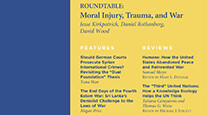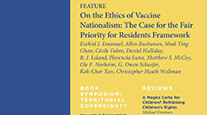Stuart A. Cohen (reviewer)
This volume of collected essays, most of which have been published in earlier volumes in the Ethikon Series in Comparative Ethics, seeks to bring a more concentrated focus on specifically Jewish outlooks regarding three key themes: "Political Order and Civil Society"; "Territory, Sovereignty, and International Society"; and "War and Peace." According to Michael Walzer, "The point is to display a range of Jewish responses to some of the hardest questions posed by modern democratic politics" (p. x).
The need for a project of this kind is by now well established, and indeed such an undertaking was proposed some thirty years ago by the late Daniel Elazar, who pioneered the modern scientific study of the Jewish political tradition. Whereas Elazar tended to posit a Jewish political tradition that was virtually homogeneous, at times even monolithic, Law, Politics, and Morality in Judaism emphasizes the diversity of approaches that the tradition has embraced. The breadth of that diversity is clearly presented in Robert Cover's essay on obligation, in which he explores different meanings attached to the Hebrew term mitzvah—which can be literally translated as "commandment" but has the general meaning of "incumbent obligation" (p. 3)—and draws out key differences between the rhetoric of obligation generated by Jewish jurisprudence and the rhetoric of rights generated by the social contract tradition. Diversity is also highlighted in the exchange on territory and ownership between David Novak and Noam Zohar, which explores, in addition to much else, the extent of the limitations imposed on human juridical and exegetical autonomy by the traditional teaching that all human sovereignty is subordinate to that of God.
This volume also shows that the research agenda of the study of the Jewish political tradition has changed, from one of rediscovery to debate. The essentially archeological enterprise of excavating politically relevant ancient texts suffering from centuries of scholarly neglect no longer predominates, partly because it is well on the way to completion: Walzer and others have already published two thick volumes of documents under the collective title The Jewish Political Tradition (New Haven: Yale University Press, 2000 and 2003), with more to follow. Law, Politics, and Morality in Judaism shows that the current generation of scholars is no longer interested in just recording and analyzing the tradition. They also wish to debate with it and test its contemporary relevance on their own terms.
One of the central challenges addressed by several of the essays involves the question of how a tradition that developed under conditions of exile deals with the twin transformations generated by the Jews' attainment of civic equality in the Diaspora and their achievement of political sovereignty in Israel. These challenges are highlighted in Suzanne Last Stone's essay, which argues that rabbinic teachings, with their emphasis on the distinctiveness of Jewish duties of association, left the Jewish tradition with "few resources from which to build a modern, liberal conception of civil society" (p. 21). Hence, it is singularly ill equipped to come to terms with the notion of universal values and equal citizen rights—for non-Jews in a Jewish polity as much as for Jews in one that is gentile. Menachem Fisch's essay likewise addresses the need for a relocation of the Jewish political tradition in his arguments about the difficulties involved in realizing "some form of religiously justified pluralism" (p. 113) in the state of Israel.
Finally, three essays in Law, Politics, and Morality in Judaism seek to demonstrate the relevance of Jewish thought to contemporary debates about the exercise of coercive power in the context of international conflict. While the three essays in this section on war and peace are certainly informative, all are showing signs of age. Pathbreaking when they were first published, they do not track more contemporary scholarly advances that have developed in response to the rapid march of events.
The kaleidoscopic nature of Israel's force agenda, for instance, has necessitated a much more forensic analysis of the traditional Jewish distinction between "commanded" and "permitted" wars than is explored (albeit with considerable sensitivity) in Walzer's contribution to the volume. Can these traditional categories incorporate all the forms of "preemptive" action now undertaken by the Israel Defense Force (IDF)? Do they also encompass "preventative" strikes? And how about an "offensive-defensive" action, of the type exemplified by Israel's attack on Lebanese targets in response to Hezbollah assaults in July 2006? In the years since Walzer's essay first appeared (1996), these and similar questions have been the subjects of considerable analysis in Israeli national religious circles.
Even more attention has been paid to the jus in bello issues raised by Aviezer Ravitzky's essay, "Prohibited Wars" (also first published in 1996), and to the moral questions relating to self-sacrifice and killing in conflict situations short of all-out war addressed by Geoffrey Levey in his 1987 essay, "Judaism and the Obligation to Die for the State." These have become matters of highly concrete concern to the increasing numbers of religiously orthodox men and women who now serve in the IDF, and who must personally confront the ethical issues generated by asymmetric warfare and counterinsurgency operations, of the sort conducted both in Lebanon and the Occupied Territories. The essays in this volume that deal with these issues offer only a small and early sample from the vast library of books, articles, and Web sites now devoted to the myriad ethical issues (collateral damage, treatment of prisoners, the duty of soldiers to recover the bodies of their fallen comrades, and so on) to which such conflicts, especially, give rise.
That said, Law, Politics, and Morality remains a valuable collection. For one thing, it brings together important essays that might otherwise not be easily accessible. It also constitutes a period piece, showing how far the study of the Jewish political tradition has advanced in recent years—and how much work still remains to be done.
—Stuart A. Cohen, Bar-Ilan University

Ethics & International Affairs Volume 21.2 (Summer 2007): Book Reviews: Law Politics and Morality in Judaism [Full Text]
Jun 1, 2007


